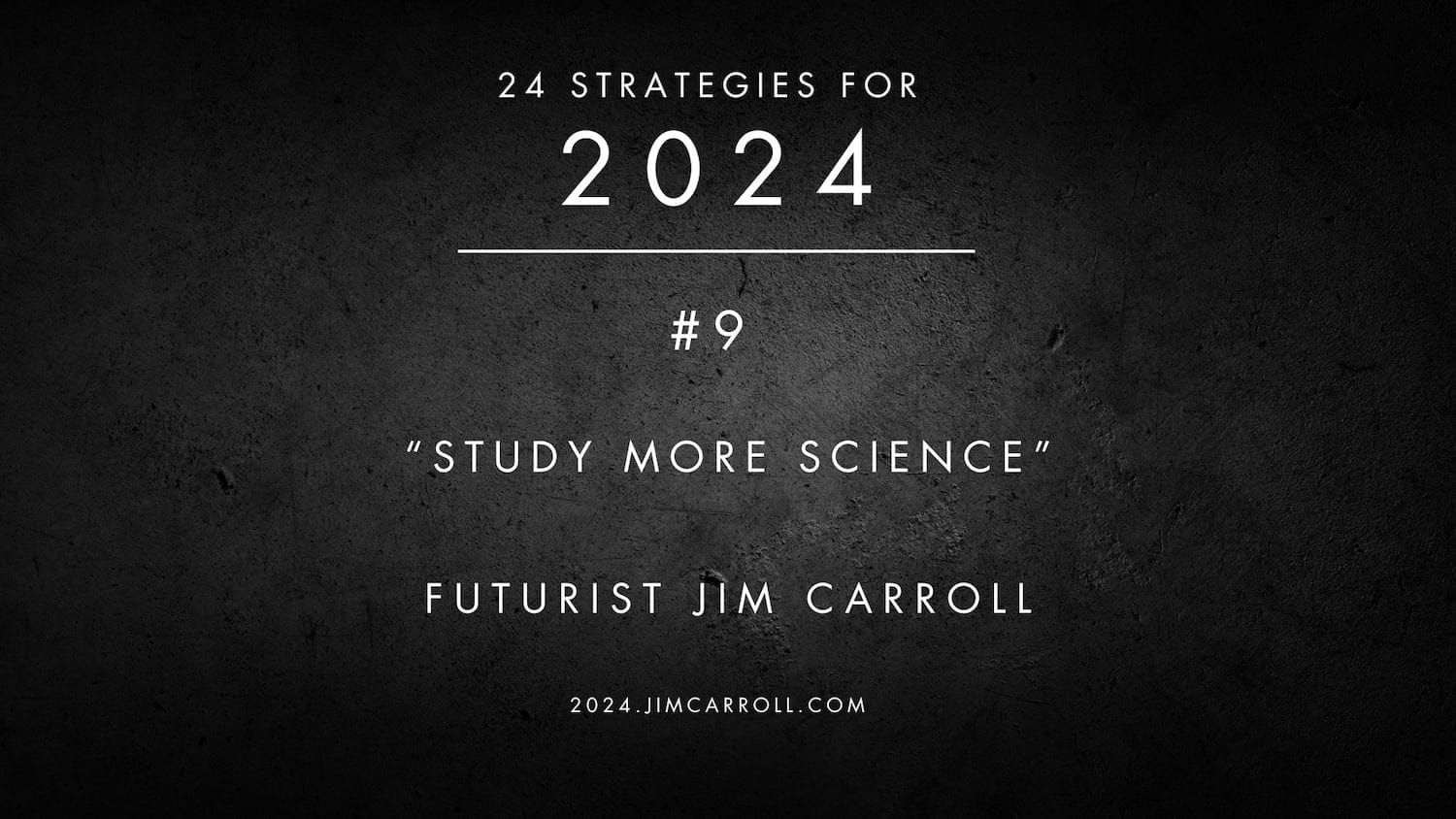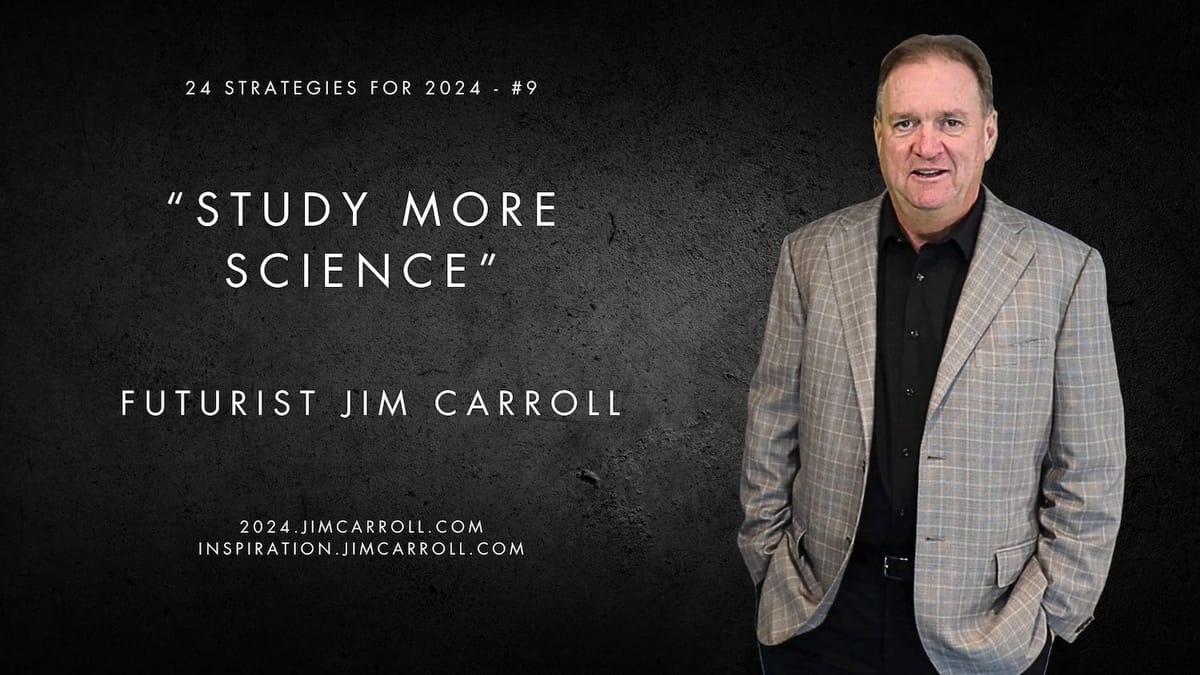Futurist Jim Carroll is running a series that began November 27, 2023, and will end on January 1, 2024 - '24 Strategies for 2024.' Rather than running a trend series for the upcoming year as he has previously, this series will examine a number of his personal beliefs on how to best align yourself with the future. There will be a post each weekday, excluding weekends and holidays, until the series runs its course. You will find it on his blog at
https://blog.jimcarroll.com,
or on the website
https://2024.jimcarroll.com
If science is going to define much of your tomorrow, wouldn't it make sense to know more about it?
By the time you read this post, I will be undergoing what is known as a Photorefractive Keratectomy (PRK) surgery on my right at the world-renowned Herzig Eye Institute in downtown Toronto. It's a relatively minor procedure for a small eyesight correction; it's an update to the original vision improvement that I saw from a Refractive Lens Exchange surgery back in 2013. That permitted me to finally abandon contact lenses after 34 years of use. Along the way, there have been a couple of Lasik touchups to that procedure, plus another small procedure to deal with a bit of Posterior Capsule Opacification!
That's a lot of vision correction procedures, but Herzig stands behind their lifetime guarantee of quality vision.
Yes, for some people it can take a lot to trust the science of this type of surgical eye care - I know MANY people who have been very nervous about LASIK or other procedures, and who later confess to me that they should never have waited so long. Yet in my case, I have complete trust in Sheldon Herzig, the surgeon who will undertake the procedure tomorrow. That's because I live a life in which I trust science, and I try to immerse myself in science as much as I can.
I was thinking about all this in the context of my day job - I study tomorrow and interpret that for other people. And so for me, science isn't just something that involves a matter of trust - I also know that science defines the future of just about everything. With that in mind, I spend a lot of time studying a LOT of science for the many keynotes I undertake. Science helps me to interpret the trends of our fast-moving world. That matters.
Maybe you should also consider studying more science to better deal with your fast-moving world, both personally and professionally. It will inform your ability to make the decisions that are necessary along the way, whether for your business, industry, career, or personal life.
That's why this is strategy number 9 of my 24 Strategies for 2024 series.

In my case, the deep study of scientific literature and trends informs many of my keynotes, with several recent deep dives involving a wide variety of disparate topics. These have included:
- research into trends involving pharmaceutical development and clinical trials;
- the transition of ammonia into a potential energy source involving what is referred to as 'blue ammonia' and 'green ammonia', and the transitional steps on this particular scientific voyage;
- the acceleration and transition of battery science and the impact not only on the vehicle industry but also on the utility and energy supply industry;
- artificial intelligence (of course); the acceleration of genomic medicine and the impact on personalized medicine concepts;
- the decline of the traditional carbon economy and opportunities for innovation in the petrochemical sector;
- new materials that allow for the creation of solar cells that permit plants to grow underneath, providing for dual-purpose energy/food farms;
- new scientific materials that permit new advances with 3d printing; and so much more.
That's a lot of science!
The fact is, it used to be extremely difficult to do this type of research, but it is becoming easier with more sophisticated knowledge research tools becoming available all the time. In my case, it's not uncommon for me to use my various research tools to grab several hundred, if not thousands, of articles on a particular topic that I am immersed in. I don't consider it my job to walk on stage and give fluffy, generic keynotes full of fluffy thoughts; it's my job to immerse myself in the trends and issues that the client has engaged me for and to do that, I study the science. It's my job to give hard data based on well-researched conclusions and basic facts, promulgated into specific probable trends.
You don't have to go that far, but wouldn't it make a lot of sense to go further with the science in your life to better understand what is going on all around you?
The challenge today, of course, is there is a lot more science happening at a far faster pace. According to a study published in Nature, the overall annual growth rate of science amounts to 4.10% with a doubling time of 17.3 years; another study indicates a growth rate of about 5.6% per year and a doubling time of 13 years. That's a lot of new science. Think about how much new science there is by considering some older data. Years ago, I put into perspective the reality of the acceleration of scientific information, by outlining the acceleration of medical knowledge and research into just one field of medical science: heart disease. Simple fact: there were 3,672 scholarly articles about adult coronary heart disease in 2004. If a doctor or medical professional spent 15 minutes per article, it would take about 115 eight-hour days to read them all. Now think about the fact that back then, coronary artery disease was but one of 12,000 “known diseases."
The thing -- all this new knowledge leads to a new and different future, full of discovery and opportunity. When doing a healthcare or pharma industry keynote, for example, I will often note that we live in an era that is seeing an acceleration of medical procedures and treatments, the emergence of pharmaceuticals and bio-materials, fascinating new medical technologies and devices, as well as the discovery of new diagnostics and methodologies for treatment. To name but a few areas!
In that context, think about your world - your job, career, profession, company, or industry. What new ideas, products, services, and disruptive trends should you be aware of that are emerging at a fast pace? Study the science - take on the job of tracking more science as it unfolds.
Becoming a science tracker. That's a key strategy for 2024.
Why does scientific insight - even if you are not a scientist - matter? Because it informs you on what comes next, and what you might do about it. It helps you better interpret and understand the trends around you. It helps you to assess the ongoing flood of new information that crosses through your life every day. It helps you to cut through to the real trends, balancing reality against the hype. It helps you stay on top of a world that is otherwise overwhelming.
It helps you to determine what to do next!
Futurist Jim Carroll reads a lot of stuff. For his research, he has mastered the art of high-speed skimming and summarizing but is now using a variety of AI-based tools to do the skimming and summarizing for him.

